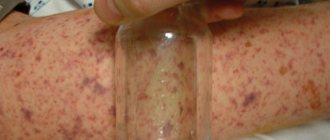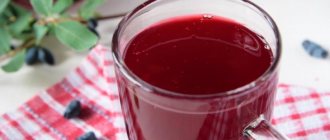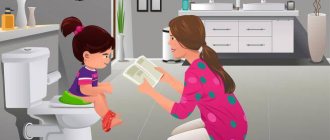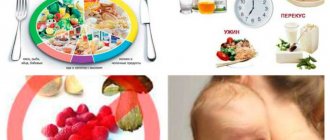Causes of constipation in adults
The causes of constipation include a number of medical conditions and social factors (lifestyle, stress, etc.). Temporary constipation in adults quite often occurs due to poor diet, travel, taking certain medications, and during periods of illness. Let's look at the most common causes of constipation in order.
Among the medical causes of constipation, there are organic and functional ones.
Organic causes of constipation include diseases of the stomach and intestines that interfere with normal bowel movements. These include:
- Various congenital anatomical anomalies of the intestine;
The period after surgery on the intestines or stomach;
Inflammatory processes in the intestines;
Neoplasms (tumors of the intestine or surrounding organs).
Functional causes of constipation include the following:
- Emotional disorders (stress, depression, sleep disturbances, fears, conflicts, etc.);
Violation of peristalsis, i.e. contractions of the intestinal muscles, which prevents the movement of feces and bowel movements. Violation of peristalsis can be associated with both a violation of the diet, consumption of insufficient amounts of liquid, food with a small amount of plant fiber, and with a lack of physical activity and physical inactivity. Fiber, i.e. plant fibers contained in vegetables, fruits, and cereals increase the volume of feces. Lack of physical activity reduces the tone of the intestinal muscles and they stop contracting;
Taking certain medications can negatively affect intestinal motility and interfere with bowel movements. These groups of drugs include antibiotics, non-steroidal anti-inflammatory drugs (ibuprofen, diclofenac), antispasmodics, antifungal drugs, etc.
Long-term use of laxatives can also have a negative effect, which can contribute to the development of dysbiosis and decreased intestinal tone.
Constipation can lead to unpleasant consequences and significantly reduce the quality of life. Prolonged constipation is accompanied by abdominal pain, bloating, lack of appetite, etc. Prolonged absence of bowel movements increases the risk of:
Poisoning of the body with harmful substances (intoxication);
Disorders of internal organs;
- Development of polyps and other intestinal cancers
Fecal intoxication is poisoning of the body by rotting food debris caused by delayed bowel movements and accumulation of feces in the intestines. The condition can occur both in diseases of the gastrointestinal tract and in pathologies of other organs (endocrine glands, nerve fibers, etc.). The development of intoxication requires immediate therapy aimed at cleansing the intestines and treating the primary disease.
Medical treatment of constipation
Medical treatment of constipation, of course, includes drug therapy.
The most popular are the so-called pharmacological prokinetic drugs.
This group of drugs is designed to stimulate natural intestinal peristalsis, while eliminating the pathogenicity of constipation.
The group of prokinetics includes the following drugs:
- Motilium, Motila (all with the active substance Domperidone);
- Ganaton, Itomed and others (with the active substance Itopride);
- Neobutin (active substance trimebutine).
Can bananas be included in the diet if poisoned?
If the genesis of intoxication was microbial in nature, and therapy consisted of long-term use of antibiotics, then treatment of constipation will now require taking so-called drugs from the group of probiotics. These include: Hilak Forte, Linex, Bifiform, Enterol and Rioflora.
In certain cases (with prolonged constipation, more than 5 days and a feeling of heaviness in the lower abdomen), the doctor may also prescribe laxatives.
All laxatives are divided into two groups according to the mechanism of their effect on the human body. Osmotic drugs that relax the intestines are aimed at retaining moisture in the lumen of the herbal canal and increasing the volume of feces. Emollient laxatives are designed to soften stool and facilitate the process of defecation. As a rule, doctors prescribe drugs such as glycerol, petroleum jelly, senna herb, lactulose, bisacodyl or sodium docusate.
The occurrence of intoxication due to constipation
The occurrence of intoxication may be associated with disturbances in intestinal motility, the appearance of obstacles to the passage of food debris, or an increase in the density of feces.
If there is no stool for more than 2 days, a large amount of protein food residues accumulate in the intestines, which rot and form toxins. The intestinal walls have good absorption capacity, so decay products enter the blood and negatively affect the internal organs, primarily the central nervous system.
The characteristic symptoms of intoxication are caused by poisoning of various brain structures, the reaction of the vomiting center to toxins and impaired absorption of nutrients in diseases of the gastrointestinal tract.
With prolonged constipation, some toxins are removed from the bloodstream through the skin, liver and kidneys, which can cause dermatological problems (inflammation, acne, peeling), discoloration of natural discharge and a decrease in liver and kidney functions.
Types and causes of fecal intoxication
A condition in which toxins from feces enter the bloodstream can be caused by lifestyle, pathologies of the nervous and endocrine systems, the presence of mechanical obstacles in the gastrointestinal tract and other factors.
Depending on the etiology, doctors distinguish the following types of constipation:
- Nutritional. The reason is poor nutrition and non-compliance with the drinking regime. Risk factors: frequent consumption of flour products, sweets and protein products, lack of water and plant foods rich in dietary fiber (fiber).
- Hypodynamic. Lack of physical activity for a long time leads to decreased peristalsis and impaired fecal movement. The occurrence of hypodynamic constipation is typical for elderly patients, pregnant women, people leading a sedentary lifestyle or suffering from diseases whose treatment requires bed rest.
- Mechanical. Diagnosed in patients with developmental pathologies of the colon and rectum, scars, adhesions, diverticula and intestinal neoplasms.
- Neurogenic. The occurrence of pathology is associated with frequent stress, discomfort from the lack of a suitable toilet and fear of pain in the presence of anal fissures or hemorrhoids.
- Constipation caused by intestinal diseases. The cause of constipation in adults and children can be inflammatory processes in the small and large intestines (colitis, enteritis). Congenital deficiency of nerve fibers in the colon (Hirschsprung's disease), which leads to severe intoxication, is diagnosed mainly in early childhood.
- Proctogenic. It can develop with inflammatory diseases of the rectum, decreased sensitivity of its walls, the presence of polyps and other neoplasms.
- Toxic. It is provoked by working with heavy metals and toxic substances (lead, mercury, benzene, etc.), smoking and waste products of parasites (for example, helminths).
- Drug. Frequent use of drugs based on iron compounds, antispasmodics, analgesics, diuretics and some non-steroidal anti-inflammatory drugs (for example, acetylsalicylic acid) can lead to fecal retention and the development of intoxication.
- Endocrine. The causes may be dysfunction of the parathyroid glands, hypothyroidism, increased concentration of progesterone in the blood during pregnancy, etc.
Depending on the duration and intensity of symptoms, gastroenterologists and proctologists distinguish acute, subacute and chronic intoxication.
Symptoms of intoxication
Signs of fecal intoxication:
In some cases, the patient experiences an increase in temperature above subfebrile. If there is no stool for more than 2-3 days, but symptoms of intoxication have not appeared or are mild, contacting a doctor is still necessary, since delayed bowel movements may indicate severe gastrointestinal pathologies.
Symptoms of the disorder
Symptoms of intoxication during constipation can be different and depend on the underlying diagnosis, the state of the immune system and the characteristics of the individual patient. The pathological process happens:
We have selected useful articles on the topic
The main causes of diarrhea during a trip to the sea and the best ways to eliminate them
02.06.2019
Why does colitis occur in the lower abdomen?
02.06.2019
What foods increase the process of gas formation and why?
02.06.2019
- protracted;
- subacute;
- spicy.
When a person cannot go to the toilet for a long time, he experiences nausea and vomiting.
The severity of symptoms directly depends on the time during which there is no bowel movement. Every minute, toxic substances increasingly poison the body of the sick person. In the presence of an acute form of deviation, the patient complains of:
- painful sensation in the head;
- muscle weakness;
- nausea and gag reflex;
- increase in body temperature;
- decreased performance;
- lack of appetite.
The intensity of these signs is rapidly increasing. Depending on the main diagnosis, additional symptoms may occur. The chronic form of the course is accompanied by:
- the presence of a dense coating on the tongue;
- lack of craving for food;

Intoxication can cause insomnia
- nauseating breath;
- rapid hair loss;
- apathy;
- swelling in the limbs;
- insomnia;
- loss of body weight.
The intensity of symptoms in the chronic form is less pronounced.
First aid and therapy
Conservative and surgical therapy is used to treat intoxication and the causes of the pathology. Drug therapy includes the following drugs:
- gentle remedies for constipation (Duphalac, buckthorn decoction);
- probiotics (Lactovit, Linex, Immunovit);
- antifoam agents (Espumizan);
- prokinetics to stimulate peristalsis (Motilium, Domperon);
- antispasmodics (Spazmalgon, No-shpa, Papaverine).
The following are prescribed as first aid in case of severe condition of the patient’s body:
- siphon enema;
- infusion therapy (droppers) with drugs to restore water-electrolyte balance and remove toxins (Ringer's solution, Reogluman, Trisol, etc.).
To treat mechanical constipation and some intestinal diseases, surgical intervention is used, the purpose of which may be the elimination of nodes, loops, adhesions and other mechanical obstacles, the formation of an anastomosis, the removal of a colostomy, the removal of a pathological section of the intestine, etc.
Treatment methods
During therapy, primary measures should be aimed at eliminating intestinal dysfunction. The patient is prescribed a diet. It includes foods enriched with fiber (raw fruits and vegetables), rye bread with bran, mineral water, buckwheat porridge, and fermented milk products. These products speed up the release of feces from the intestines.
Important! People with constipation accompanied by severe flatulence should completely avoid legumes, sorrel and cabbage from the menu. Grape and apple juices are also contraindicated. The diet should include prunes and dried fruit puree.
Fecal intoxication with severe intestinal peristalsis requires patients to be prescribed antispastic drugs (No-shpa, Papazol, Papaverine).

During constipation and intoxication, you need to drink plenty of fluids. You should drink about two liters of water per day. Warm mineral water is recommended for constipation.
In case of intestinal intoxication, frequent consumption of food is necessary. There should be at least five meals per day. The breaks between them cannot be too long.
For constipation in adults, laxatives are prescribed with caution. These drugs are effective only in the initial stages of constipation. Subsequently, a person develops a persistent addiction to them, and they cease to act properly.
Effective remedies for constipation include:
- Vaseline oil;
- preparations with senna extract;
- Bisacodyl;
- medications based on picosulfate;
- magnesium sulfate, which increases the concentration of fluid in the intestines;
- lactulose-based medications;
- Macrogol.
Combination agents may be prescribed. They include plant substances (Regulax, Agiolax). Microenemas are also used. One of these drugs is Microlax.
To eliminate intoxication of the body, intestinal lavage can be performed. Enterosorbents (Smecta and Enterosgel) accelerate the elimination of toxic components. Diuretics may also be prescribed additionally.
In some cases, intoxication of the body due to constipation requires oxygen therapy. In severe cases of fecal poisoning, blood transfusions may be prescribed.
Possible complications
Severe complications arise primarily not due to intoxication of the body, but due to the cause of the problem (defecation disorder). Fecal retention can cause the following complications:
- haemorrhoids;
- disturbance of intestinal microflora (dysbacteriosis);
- peritonitis;
- fecal incontinence;
- cicatricial changes in the intestinal walls;
- internal bleeding, etc.
If acute intestinal obstruction develops, fatal complications can develop within 6 hours.
Prevention
To prevent the development of intoxication, the patient must:
- Eat a healthy diet. To prevent constipation, you should include foods rich in fiber (dried fruits, cereals, bran, vegetables) in your menu and reduce your consumption of meat, flour and confectionery products. The normal amount of fiber for an adult is 20–30 g per day. Fermented milk products are beneficial for the gastrointestinal tract: for a gentle laxative effect, you can drink 1 glass of kefir at night.
- Monitor your water consumption. Fluid deficiency leads to hardening of stool, so to prevent constipation you need to drink at least 30–40 ml of water per 1 kg of body weight.
- Change your lifestyle. Patients suffering from constipation should stop smoking and frequent drinking, increase the amount of physical activity and replace sugary and protein snacks with plant-based foods.
- Undergo preventive medical examinations in a timely manner. Regular medical examinations allow you to diagnose pathologies of the gastrointestinal tract and other internal organs at an early stage, which reduces the risk of developing severe intoxication due to chronic inflammation or mechanical obstruction of the intestine. If symptoms appear, you should immediately consult a proctologist or gastroenterologist: timely therapy reduces the likelihood of severe complications of the disease.
If the patient is at high risk of developing intestinal obstruction, prophylactic stenting is recommended - installation of an artificial cylindrical frame (stent) that prevents narrowing of the intestinal area.
Defecation is a natural way of removing waste products from the body. Indigestible food elements, drug metabolites, and toxic substances neutralized by the liver are released with feces. Intoxication due to constipation worsens the general condition of the body. It is harmful to adults, but is especially dangerous for children and the elderly.
Treatment of constipation with folk remedies
Prunes. Pour 0.5 kg of damsons into 3.5 liters of water and boil for 20-25 minutes over low heat. Cool and add 50 g of buckthorn bark and boil again over low heat for 20-25 minutes. Cool, strain and pour in 200 g of Kholosas (rosehip extract). Drink 0.5 cups at night.
Senna. Mix 2 teaspoons of senna with 100 g of prunes and pour 3 cups of boiling water. Leave for 3 hours and strain. Drink 3-5 tbsp. spoons every hour until you go to the toilet.
Lemon with orange. Squeeze the juice from 1 lemon and mix it with a raw egg yolk (preferably homemade). Pour the resulting mixture into 1 glass with orange juice.
Read also Flatulence (bloating). Causes, symptoms and treatment of flatulence
Bran. For the first 10 days, take 1 teaspoon, brew with boiling water and strain after it has cooled. The settled crumb should be eaten with meals 3 times a day. 11-24 days take 2 tbsp. spoons 3 times a day with meals. Afterwards, eat dry bran 2 teaspoons 3 times a day during meals. The entire course is 2 months.
Dried fruits with honey. Take 500 g of soaked dried apricots, prunes, raisins, figs and dates. Grind through a meat grinder and add 5 tbsp. spoons of honey. Store in the refrigerator and use in small quantities daily, such as adding to oatmeal.
Fresh aloe juice. Take 1 teaspoon of freshly squeezed aloe juice before meals 3 times a day.
Fresh onion juice. Take 1 teaspoon before meals 3-4 times a day.
Melissa. Pour 1 glass of hot boiled water into 3 g of lemon balm leaves; when the infusion has cooled, do an enema by introducing 30-40 ml of strained infusion.
Infusion of milk from walnut kernels. Grind 100 g of walnut kernels in a mortar and pour in 1 liter of hot milk. Bring to a boil and cook for 5 m over low heat. When cool, strain. For taste you can add 1 tbsp. spoon of sugar. Take 1/3 cup warm 2-5 times a day (in the morning on an empty stomach, all subsequent doses 1 hour before meals).
Dried fruit teas. During the day, simply drink tea made from dried apples or cherries.
A glass of kefir at night. 1-2 hours before bedtime, drink a glass of kefir, but fresh, since kefir that has stood for 2-3 days has a fixing effect.
A glass of water on an empty stomach. The water should be cool or room temperature.
What is it and symptoms
The frequency of stool varies from person to person. The norm is at least 3 bowel movements per week. If bowel movements occur less frequently or with normal frequency, but with incomplete bowel movements, then the sufferer will diagnose himself with constipation without consulting a doctor.
When the evacuation of feces is delayed, toxic substances that the liver was able to neutralize and food debris begin to decompose. Absorption in the rectum is quite high, toxins begin to flow back into the systemic bloodstream. The feces become compacted, forming fecal stone.
In the first few days, the symptoms of poisoning of the body with waste products are invisible. If constipation was an isolated occurrence, stool frequency has returned to normal and the body’s condition will improve without medical intervention.
General signs of intoxication:
- headache;
- arthralgia;
- stomach ache;
- alternating constipation and diarrhea;
- dyspeptic symptoms;
- weakness and increased fatigue;
- lack of appetite;
- constant drowsiness.
An indirect sign indicating a violation of the removal of processed products from the body is a variety of rashes and dermatological diseases.
Chronic fecal intoxication has different symptoms. Present:
- problems with the gastrointestinal tract;
- the appearance of acne and plaque on the mucous membranes in the oral cavity;
- irritability;
- change in body weight;
- lack of appetite;
- hair loss.
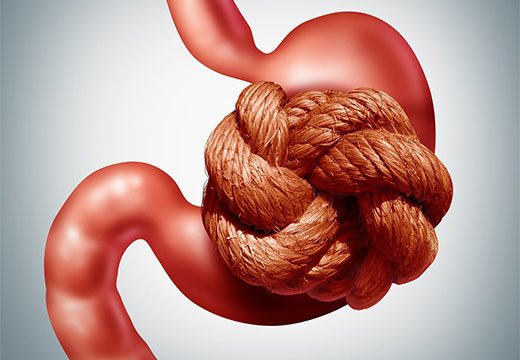
How to restore body function after poisoning
Constipation after poisoning, what to do ? The stomach is the first thing to suffer when eating poor quality food. Harmful microorganisms that enter the cavity of this organ with bad products cause an inflammatory process in its mucous membranes. After partial digestion, toxic substances penetrate the intestines and blood.
Symptoms of food poisoning include:
- nausea accompanied by vomiting;
- muscle pain;
- chills;
- lethargy and fever;
- headache;
- weakness and drowsiness;
- loose stool.
Therapy after poisoning consists of restoring the microflora of the stomach and intestines. To do this, the patient is prescribed special medications containing enzymes and the necessary beneficial bacteria.
In addition, to eliminate constipation and improve bowel function, the first couple of weeks after poisoning must adhere to a special therapeutic diet and drinking regimen.
Diet during illness
After food poisoning, you need to give up all foods that put stress on the body. It is recommended to temporarily exclude fatty meats and fish from the diet. You cannot eat smoked or pickled foods. It’s better not to indulge in sweets either.
In addition, for a couple of weeks after poisoning, it is important not to drink alcohol, strong tea, coffee, carbonated water and solid food. To prevent unnecessary stomach irritation, it is important to ensure that drinks and food consumed are not too cold or hot.
The therapeutic diet after poisoning should consist of small and frequent meals. To make it easier for the stomach to digest food, food should be chopped or pureed before consumption.
During the recovery period, the following foods should be included in the diet:
- vegetable soups (without potatoes);
- porridges cooked in water (buckwheat, oatmeal, wheat, etc.);
- low-fat chicken broth;
- boiled chicken and fish;
- bran;
- boiled beets;
- baked pumpkin;
- fermented milk products (without dyes and flavors);
- greens, especially dill.
In addition to proper nutrition, light exercise will help restore stool. But playing sports should not be exhausting, especially if we are talking about a weakened body after poisoning.
To restore intestinal function and strengthen the immune system, it would be useful to drink a vitamin complex based on dietary fiber.
Types and causes of fecal intoxication
The main cause of defecation disorders is intestinal dysfunction. The organ does not saturate the feces with liquid, its contractile function is impaired. There is no pushing of feces into the rectum.
There are many reasons for this condition. Depending on the etiology of the pathological condition, the following types of constipation are distinguished:
- Nutritional form – the main cause is malnutrition. This is a lack of fluid, plant fiber, vitamins, starvation.
- Neurogenic form - the patient independently suppresses the urge to have a bowel movement. The main reasons for this behavior are the lack of a favorite toilet, the presence of cracks in the rectum, and hemorrhoids.
- Hypodynamic form – lack of movement. Elderly people and pregnant women are more often affected.
- Inflammatory or infectious in nature - the presence of colitis, enterocolitis of various etiologies.
- Proctogenic form - impaired sensitivity of the rectum.
- Mechanical - develops due to intestinal stenosis caused by diseases, cancerous tumors.
- Toxic – caused by the chronic action of toxic substances. For example, in case of lead poisoning in smokers.
- Medicinal form – develops with long-term use of medications as a side effect of the drug. It occurs more often when taking aspirin, antispasmodics, iron supplements, and antidepressants.
- Endocrine form - develops with various pathologies of the endocrine glands. Common causes are diabetes mellitus and thyroid disease. Thyroxine has a tonic effect on the intestinal muscles; its deficiency has a detrimental effect on the motor function of the organ.
Types of constipation
Alimentary constipation. The cause of this type of constipation is poor nutrition: the diet contains little plant foods, water, vitamins, calcium salts, but, on the other hand, flour and sweets predominate.
Neurogenic constipation. It occurs due to dysregulation of intestinal motility (contraction). It is also called “lazy gut syndrome.” This type is very common. When a person suppresses the urge to defecate (during a long trip, on a hike, or when there is simply no way to calmly use the toilet), he experiences habitual constipation. The cause of this type of constipation may be fear of pain, for example, with hemorrhoids or anal fissures. Neurogenic constipation also affects people who are accustomed to lying in bed for a long time in the morning, fighting the urge to go to the toilet, as well as patients in the hospital on bed rest who cannot use a bedpan because they are embarrassed by the people who are nearby.
Hypodynamic constipation. Directly related to low physical activity. This type often occurs in older people, pregnant women and bedridden patients.
Read also Coronary heart disease (CHD) - symptoms, causes, types and treatment of CHD
Constipation associated with inflammatory bowel disease. Acts in tandem with chronic colitis or inflammation of the colon.
Proctogenic constipation. Occurs with paraproctitis, hemorrhoids, anal fissures and decreased sensitivity of the rectum.
Mechanical constipation. Occurs in patients with intestinal tumors, mechanical compression of the rectum from the outside, and with cicatricial changes in the colon.
Constipation is abnormal. This type is associated with anomalies (disorders) in the development of the large intestine.
Toxic constipation. Occurs due to poisoning with lead, mercury, benzene and other toxic substances. Smokers are also at risk, because they are constantly in a state of nicotine poisoning. Poisoning can also be the waste products of helminths (worms).
Constipation due to disturbances in water and electrolyte metabolism. Occurs with heart or kidney failure, as well as with dehydration (dehydration).
Endocrine constipation. This type of constipation is observed when the thyroid gland is malfunctioning, pituitary insufficiency, diabetes mellitus, as well as during menopause, when hormonal levels change.
Drug-induced constipation. Caused by taking painkillers, aspirin, antidepressants, diuretics, antispasmodics, bismuth and others.
Before starting treatment for constipation, it is imperative to identify the cause and determine its type, for which you should undergo a full examination.
Danger of the disease for adults and children
Intoxication with prolonged constipation threatens human health.
If feces remain in the intestines for a long time in adults and children, there is a risk of developing the following pathologies:
- overdistension of the rectum and colon;
- decreased sensitivity of the nerve endings of the intestines, which causes the cessation of urges and the accumulation of feces;
- compaction of feces - causes injury and bleeding from the anus;
- obstipation – formation of fecal stones. It is impossible to extract them on your own. This will have to be done in a hospital setting;
- inflammatory processes in the gastrointestinal tract;
- the appearance of rashes, including purulent ones;
- rectal cancer;
- the child has a slowdown in development, fear of defecation.
Impaired bowel movements have a negative impact on the emotional state. The patient becomes nervous and irritable.

Home treatment for constipation after intoxication
When poisoning occurs, for the entire period of therapy you should not only adhere to a certain diet, but also exclude from your diet foods that make up a fairly extensive list. For example, spicy and salty foods, canned food of any kind, fatty meat, fish, smoked foods, strong coffee, especially instant coffee.
How to remove alcohol from the body at home?
To prevent or treat constipation during the period after intoxication, a certain diet is also necessary.

It is important to include such foods and dishes in your diet as:
- Bran bread;
- Fermented milk products - kefir, fermented baked milk, cottage cheese, yogurt. All these products must be environmentally friendly, that is, they must not contain preservatives, dyes or artificial fillers.
- Porridges cooked in water - buckwheat, oatmeal, millet.
- Soups, preferably vegetable, cooked in water or chicken broth. Pork or beef broths should be excluded from your diet.
- The bread should not be fresh, it should be yesterday’s bread.
- Fruits are best consumed baked.
It is also important to fill the intestines and stomach with liquid. Your drinking ration should include warm (not cold or hot) water (still), compotes (berry and fruit), green tea, fruit juice, rosehip decoction.
Also at home, the process of treating constipation after poisoning includes an active lifestyle. Loads should be increased gradually after the illness. Morning exercises, jogging in the fresh air and walking in the evenings are the basis for treating constipation.
Thanks to mobility, natural intestinal motility will improve and all its functions will be quickly restored, including the process of defecation.
But, if constipation continues for more than two weeks, you should immediately consult a doctor for qualified diagnosis and treatment of this condition.
Treatment of fecal poisoning
Treatment is aimed at eliminating current constipation, normalizing the body’s condition, and searching for the causes of defecation disorders.
Therapeutic measures:
- The use of laxatives - suppositories, tablets, drops.
- Adequate fluid intake - at least 2 liters per day.
- Discontinuation of medications that cause a decrease in intestinal motility.
- Enterosorbents – Enterosgel, activated carbon, Smecta.
- Antihistamines to relieve allergy symptoms.
A doctor will help you choose safe medications to relieve intoxication symptoms. Antibiotics are not used. Treatment is carried out at home.
The following shows measures to identify the cause of constipation. The examination plan includes:
- examination and analysis of the patient's medical history;
- blood and stool tests;
- blood for thyroid hormones;
- instrumental studies - endoscopy, x-ray;
- manometry – to study intestinal motility.
Treatment of constipation is impossible without normalizing nutrition. There is currently no specialized diet. It is enough to follow the principles of rational nutrition.
The diet should include foods rich in fiber - any vegetables, fruits, oat bran. Additionally, the use of products with a laxative effect is indicated. These are beets, prunes and plums in any form, dried apricots and apricots, fermented milk drinks, flax seed.
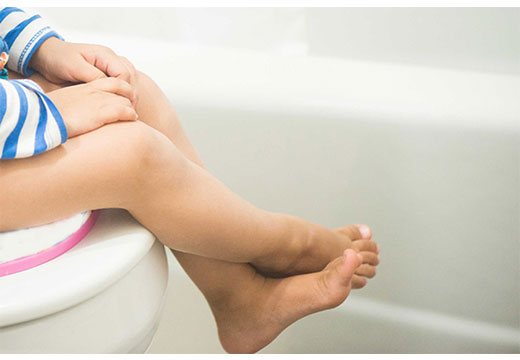
Diagnosis of constipation
To find out the causes of constipation, consultation and examination by a doctor is necessary.
Read also Hepatitis A (Botkin's disease). Causes, symptoms and treatment of hepatitis A
First, you need to contact a gastroenterologist or proctologist; for women, you may also need an examination by a gynecologist.
To diagnose and prescribe proper treatment for constipation, the doctor may prescribe: - stool examination; - study of the motor function of the colon; — Ultrasound of the abdominal organs; — consultation with a related specialist (endocrinologist, neurologist, etc.); - irrigoscopy (x-ray examination of the intestine with preliminary filling with a contrast agent using an enema); - colonoscopy (examination of a section of the intestine up to 1 m using a colonoscope inserted into the anus).
How to avoid fecal intoxication
There is only one way to prevent fecal intoxication. This is the normalization of stool - defecation at least 3 times a week. The nature of feces is mild, the process itself does not cause physical or mental suffering.
This can be achieved in the following ways:
- Normalize nutrition and drink enough fluid. Remove sweets and flour products. Add vegetables, fruits, juices.
- Physical activity - at least walk to and from work, forget about the elevator.
- Don't suppress the urges. If you want to relieve yourself, then you need to do it. And even if the toilet seat is not heated, and the tiles in the bathroom are not flowery like in your home. Your coworkers don't care what you do in the bathroom. Adequate people will not eavesdrop and spy.
- Try to resolve a sensitive issue at the same time. Sometimes even at the cost of being late for work.
- Constipation is not a shameful phenomenon. If this condition becomes chronic, it is imperative to get examined.
If intestinal intoxication is caused by any disease, then there should be additional symptoms.
